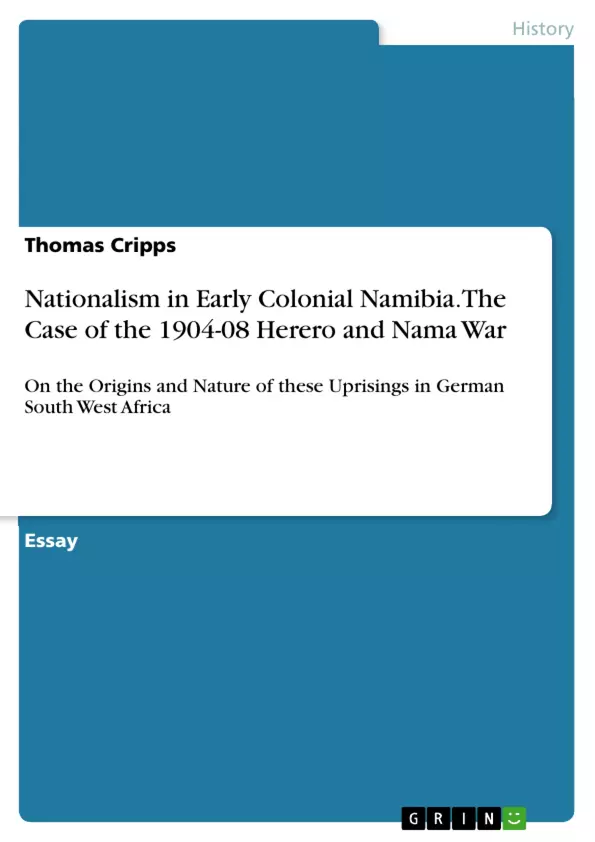The aim of this paper is to provide an overview of the debates surrounding the origins of the 1904-08 war and to answer the question how far these risings can be classified as nationalist.
From the evidence presented it is apparent that the risings in German South West Africa during this period were certainly not premeditated, planned, unified or nationalist in nature.
Inhaltsverzeichnis (Table of Contents)
- Resistance to European Rule
- The Origins of the 1904-1908 Conflict
- Classifying the Risings
Zielsetzung und Themenschwerpunkte (Objectives and Key Themes)
This paper examines the 1904-1908 Herero and Nama uprisings in German South West Africa (Namibia) and explores whether they can be classified as nationalist responses to European rule. The paper aims to analyze the concept of resistance in African history, investigate the origins of the conflict, and ultimately determine if the uprisings were driven by nationalist sentiment or other motivations.
- The Concept of Resistance in African History
- The Origins of the 1904-1908 Conflict
- The Role of Land Issues and Colonial Expansion
- The Impact of the Rinderpest Epidemic
- The Nature of Indigenous-Colonial Relationships
Zusammenfassung der Kapitel (Chapter Summaries)
- This chapter examines the historical interpretations of African resistance, moving from an initial focus on nationalism to a more nuanced understanding of resistance as a rational strategy for Africans to defend their interests under colonial rule.
- This chapter delves into the origins of the 1904-1908 conflict, discussing different perspectives on its causes. While some argue the conflict was a planned and pre-meditated revolt due to land issues, others suggest it was driven by concerns about German expansion and the failure of peace treaties. The chapter also explores the role of settler and colonist opposition to land policies in escalating tensions and ultimately leading to the outbreak of war.
- This chapter discusses the complexities of the relationship between indigenous populations and colonial forces, highlighting the presence of strategic alliances and the need to move beyond a Eurocentric view of the events as a mere uprising or rebellion. The chapter also explores the role of Samuel Maherero and his succession disputes, highlighting the divisions within the Herero community and the impact of his relationship with the colonial government on the unfolding conflict.
- This chapter examines the role of indigenous participation in colonial military operations, highlighting the support provided by Hendrik Witbooi to German forces in previous conflicts, such as the Ovambanderu Khauas-Khoi War in 1896. The chapter also discusses the later rising of the Nama after the Battle of Waterberg, suggesting that the Nama uprising was not necessarily a unified nationalist response but rather a reaction to perceived threats from the Germans.
Schlüsselwörter (Keywords)
This paper delves into the complex relationship between the Herero and Nama populations and the German colonial administration in Namibia. It focuses on the 1904-1908 conflict, examining its origins, the nature of resistance, and the role of nationalism in motivating the uprisings. Key concepts include resistance to colonial rule, land issues, colonial expansion, rinderpest epidemic, indigenous-colonial relations, and the concept of proto-nationalism.
- Arbeit zitieren
- Thomas Cripps (Autor:in), 2014, Nationalism in Early Colonial Namibia. The Case of the 1904-08 Herero and Nama War, München, GRIN Verlag, https://www.hausarbeiten.de/document/448287


